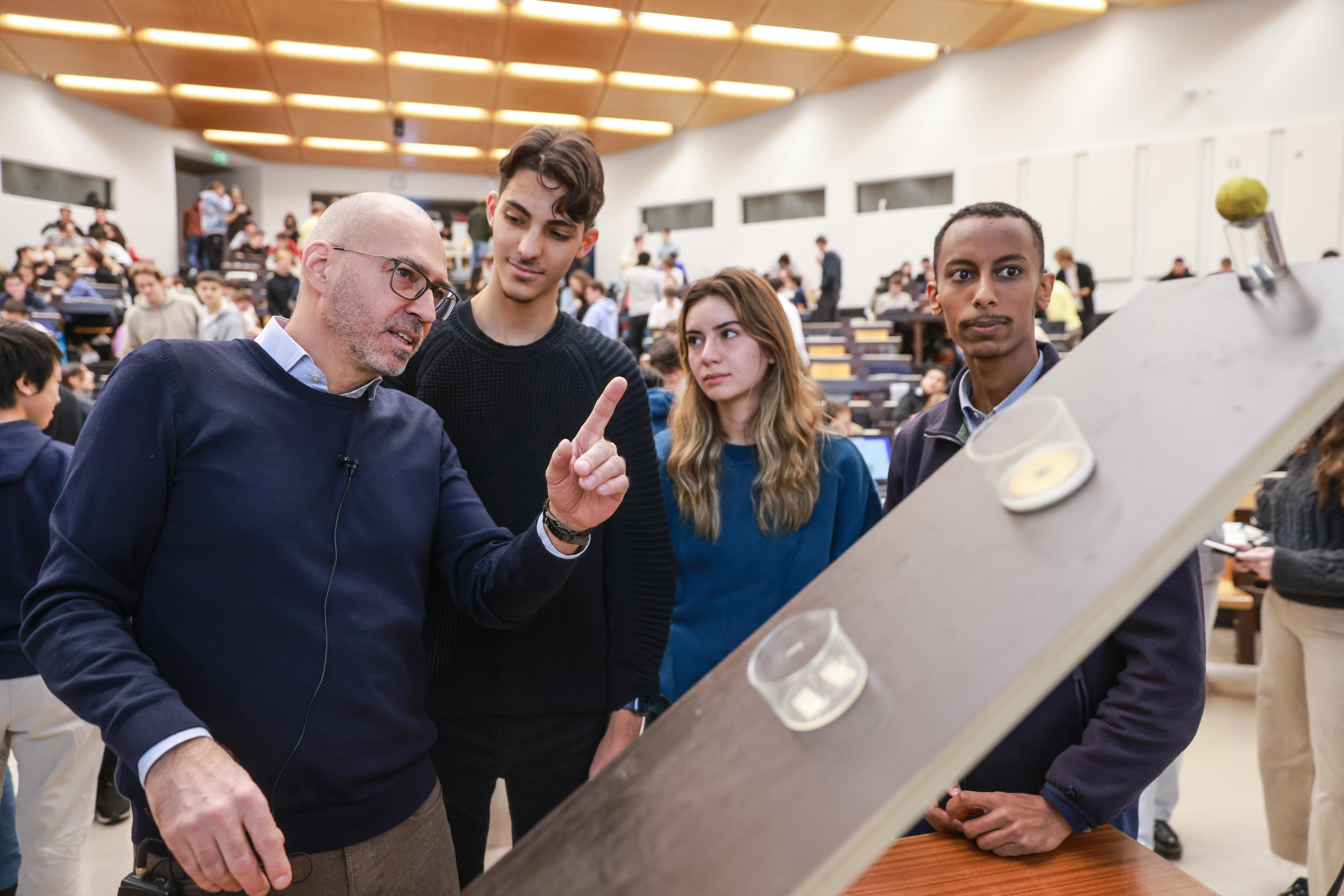“My classes are constantly evolving”

Nicolas Grandjean teaches a physics class © 2022 EPFL, Alain Herzog, CC BY-SA 4.0.
Nicolas Grandjean, who won the PolySphère award for best teacher in EPFL’s School of Basic Sciences as well as the PolySphère d’Or for best teacher overall, has a unique approach to teaching physics.
Each year, EPFL students vote for the best teacher in each section. The professor who receives the most votes also takes home the PolySphère d’Or award. The prizes are presented by AGEPoly on behalf of the student community at EPFL’s Magistrale graduation ceremony.
At the most recent ceremony, held on 1 October last year, Grandjean picked up two awards for outstanding teaching: the PolySphère award for the School of Basic Sciences and the PolySphère d’Or.

A passion for teaching
Grandjean joined EPFL as a tenure-track assistant professor in 2004 after previously working as a researcher at the French National Center for Scientific Research (CNRS). “One reason I came to EPFL was because I wanted to get experience outside the lab, share my knowledge and do some teaching,” he explains.
Alongside his research on light-matter interaction in semiconductors, Grandjean takes his role as a teacher very seriously. Between 2018 and July 2022, he even served as head of EPFL’s physics department. “It was an amazing experience,” says Grandjean, who at one point considered a career in teaching. “I especially enjoyed speaking with student representatives at teaching committee meetings, where we put our heads together to see how we could improve the classes.”
In his general mechanics and thermodynamics classes, Grandjean teaches 230 and 300 first-year students, respectively. These aren’t optional: they’re part of the core curriculum that students must pass to be admitted to the second year. “My classes, along with the analysis class, are often the ones students struggle with the most,” he says. “Personally, I take that as a challenge. Many students find these subjects boring because they had off-putting experiences at high school. It’s my job to change their minds.”

A process of continuous improvement
What is it about Grandjean’s teaching that has drawn such high praise from the student community? Part of the answer could be that he’s always looking for ways to improve his lectures. “I pay close attention to the feedback I get from students at the end of the year,” he explains. “Their comments shine a light on things I could do better. When you’ve been teaching the same classes for 10 years or more, it could be tempting to rest on your laurels – but that’s not the case for me at all. My classes are constantly evolving.”
Pace is another important aspect of Grandjean’s teaching. Delving deep into formalism, or the philosophy of mathematics, requires a high degree of focus and concentration. So Grandjean likes to switch up the tempo by building more relaxing activities into his lectures, such as videos, Q&A sessions and live physics experiments. “At EPFL, we’re lucky to have around 800 off-the-shelf experiments we can present in our lectures,” he says.
Grandjean is also an advocate of discussion, idea-sharing and working together towards a common goal. He goes the extra mile to make sure his students succeed. In the classroom, he deliberately asks trick questions and works through common errors. “For me, seeing the same mistakes come up time and again in students’ work is very instructive,” he explains. “Instead of focusing on what they got wrong, I try to figure out how I could explain the material better.”
For Grandjean, imparting knowledge is only part of the job: he also emphasizes the need for students to develop technical and critical-thinking skills. “I’m a firm believer in challenging the status quo,” he says. “That’s how researchers advance in their fields, and how engineers invent new, better and often more energy-efficient things.” He also frequently discusses his research with his students. “I think it’s important to make the connection between the theory I teach in class and my hands-on work in the lab. Whenever I get the chance, I like to go off topic and talk about my experiments or share stories from R&D.” For all his enthusiasm for fundamental physics, Grandjean’s anecdotes keep his teaching rooted in the here and now.





